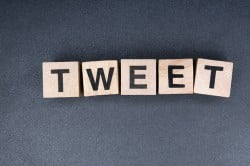There is a reason why Twitter is my FAVORITE place to hangout. I always find incredibly smart and interesting people there, like Andrew Dennis at Page One Power. Andrew had been pinging back and forth with our @AuthorityLabs account and providing some really great thoughts about the state of the search marketing industry. As the conversation progressed, I knew I had to share some of his insights with you.

When he’s not writing about link building and SEO, you’ll find him attending and/or watching live sports and despite the pain and misery they have caused him, he remains a devout Detroit Lions fan. Unfortunate football loyalties aside, he has some great thinking to share about the convergence of search and social.
The Interview
Michelle Stinson Ross: What exactly is a “social signal” as it relates to search?
Andrew Dennis: A “social signal” could be a social share/link (Tweet, +1, Like, etc.), number of social followers, click-through on social media, etc. Basically, any sort of signal from social media that a search engine could potentially track and integrate into their algorithms.
MSR: If social signals don’t directly impact search ranking, what do they impact?
AD: While social signals don’t directly impact search rankings, they can have a meaningful impact on your business and marketing as a whole. Ignoring social signals would be a mistake.
Social signals can have a major impact on branding and visibility. Larger following means increased brand awareness and exposure; with more people following your social accounts you can amplify and extend the reach of your brand and the content you share.
Also, a large social following can provide social proof for your company and cultivate a reputation of trust and authority.
MSR: How do you see SEOs leveraging the new Tweets in search results to improve brand authority?

The recent Google-Twitter deal only makes platform even more useful because tweets are starting to show up in search, meaning Twitter offers a platform for increased search visibility. Also, studies have indicated that tweets can lead to faster indexation for new pages.
Of course, I have no doubt there will be some attempts at manipulation, which Google will have to combat.
MSR: What SEO benefits do brands still get from Google+ activity?
AD: There are two main search benefits brands can attain from Google+.
One benefit is that if a person is following your brand on G+ then you can receive a slight rankings boost in their personal results. This means if that person is logged into their Google account (the one that follows your company) there is a better chance they will see your content/site in the search results.
The other potential SEO benefit applies to local search. If you’re a local company, you should absolutely claim and optimize your Google Local page. These pages are what show up in Google’s “local pack”, so you need to make sure your brand’s Local page is accurate.
To be clear, a Google+ Local page is different from a Google+ Brand page, so make sure you at least fill out your Local page. (Note: If you have a Google+ Brand page and would like to transfer your verified local data, you can do so by following this process)
Also, reviews are a factor in local pack rankings, so you need to work to solicit positive reviews on these pages as well.
MSR: How should social media be used to cultivate link building relationships?
AD: In my opinion there is no better platform for engaging and connecting with your audience (and others in your industry) than social media. This is precisely why social needs to be part of your link building strategy – social media can facilitate the types of meaningful relationships that make link acquisition easier and more effective.
Not only can you use social to connect with influencers in your niche, but once you build a positive connection with these people they will be more likely to help promote your assets, resulting in increased exposure, and of course more links. You can even use social media as an alternative (and more personal) platform for link building outreach.
MSR: How does social media listening guide optimized content production?
AD: Social signals provide insight into how your company, brand, and content are regarded by your audience. This type of insight can be invaluable in terms of marketing, because social signals will help guide your content creation as well as measure the success of existing content.

Also, don’t restrict social listening to your own brand. Leverage tools like BuzzSumo to discover what types of content the influencers in your vertical are sharing and what they’re interested in. This too can guide your content/promotion strategies.
MSR: How does social media impact mobile visibility?
AD: The impact of social on mobile is largely the same as it is on desktop search. The indexation of tweets put an increased emphasis on Twitter, but as far as influence on search rankings, social signals still do not impact mobile rankings.
However, as mentioned before social still offers branding value and increased exposure. Specific to mobile, social apps offer great opportunities for improved mobile visibility, and further amplification.
MSR: What do you do to get your search and social teams working together?
AD: Collaboration is vital to the success of our marketing department as a whole. One policy we’ve implemented that has really fostered communication and teamwork is to have a morning huddle twice a week. During this huddle we talk about current projects and strategies, and discuss situations where collaboration is needed.
Not only do these meetings help our search and social teams work together, but they ensure the whole department is on the same page. Furthermore, it allows each team to see where further collaboration might be warranted, leading to even more collaboration beyond these initial meetings.
MSR: How do you keep track of how effectively all these moving parts are working together?
AD: The aforementioned huddles certainly help keep track of everything that is happening in our marketing department. But beyond that we also utilize project management/organizational tools such as Asana, Google Docs, Skype, Google Hangouts, and email to monitor progress on our various projects.
We also use analytic tools to measure the efficacy of various initiatives, including Google Analytics, Hubspot, and custom reports.
Time for you to weigh in on the debate. How do you feel about the questions we put to Andrew? How are you using social media campaigns to impact the complicated world of search?

